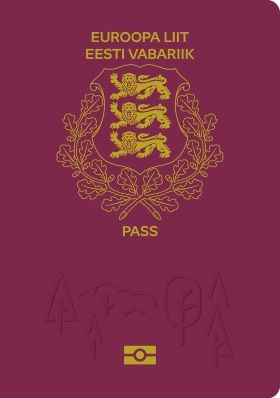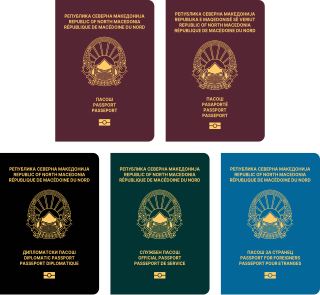Related Research Articles
The Bureau of Consular Affairs (CA) is a bureau of the United States Department of State reporting to the under secretary of state for management. The mission of the Bureau is to administer laws, formulate regulations and implement policies relating to the broad range of consular services and immigration. As of 2021, the bureau is headed by the Assistant Secretary of State for Consular Affairs, Rena Bitter.

A consul is an official representative of a government who resides in a foreign country to assist and protect citizens of the consul's country, and to promote and facilitate commercial and diplomatic relations between the two countries.

Polish nationality law is based primarily on the principle of jus sanguinis. Children born to at least one Polish parent acquire Polish citizenship irrespective of place of birth. Besides other things, Polish citizenship entitles the person to a Polish passport.

Bilhete de Identidade, commonly abbreviated as BI, was the national identity card of Portugal. Established in 1919, the BI is gradually being replaced by the Cartão de Cidadão since 2008. BI's are valid for five years from date of issue for people under the age of 25, and then for ten years, and can be renewed 6 months before expiry. It is mandatory for all citizens above the age of 10, and available optionally for children.

Serbian passport is the primary document of international travel issued to nationals of Serbia. Passports are issued and renewed by the Serbian Police on behalf of the Ministry of Internal Affairs or, if the citizen resides abroad, by the Serbian diplomatic missions. Besides serving as proof of identity and of citizenship, it facilitates the process of securing assistance from Serbian consular officials abroad, if needed.

Croatian passport is issued to citizens of the Republic of Croatia for the purpose of international travel. The passport has the purpose of serving as proof of Croatian citizenship and identity. Responsibility for their issuance lies with the Ministry of the Interior; and for citizens abroad, passports are issued by the local embassy or consulate. Croatian passports are valid for ten or five years, and are not renewable. Every Croatian citizen is also a citizen of the European Union. The passport, along with the national identity card allows for free rights of movement and residence in any of the states of the European Economic Area and Switzerland.

The Secretariat of Foreign Affairs is the government department responsible for Mexico's foreign affairs.

Romanian passport is an international travel document issued to nationals of Romania, and may also serve as proof of Romanian citizenship. Besides enabling the bearer to travel internationally and serving as indication of Romanian citizenship, the passport facilitates the process of securing assistance from Romanian consular officials abroad or other European Union member states in case a Romanian consular is absent, if needed.

The Mexican passport is the passport issued to Mexican citizens for the purpose of travelling abroad. The Mexican passport is also an official ID and proof of Mexican citizenship. According to the January 2024 Henley Visa Restrictions Index, holders of a Mexican passport can visit 159 countries without a visa, placing Mexico in the 22nd rank in terms of global travel freedom.

The Montenegrin passport is the primary document for international travel issued by Montenegro.

An Estonian passport is an international travel document issued to citizens of Estonia, and may also serve as proof of Estonian citizenship. Besides enabling the bearer to travel internationally and serving as indication of Estonian citizenship, the passport facilitates the process of securing assistance from Estonian consular officials abroad or other European Union member states in case an Estonian consular is absent, if needed. If an Estonian citizen wishes to receive an identity document, especially an Estonian passport, somewhere other than the foreign representation of the Republic of Estonia, then the bearer of the Estonian citizenship staying abroad could receive the travel documents in embassies of any EU country worldwide by paying 50 Euro. Many countries require passport validity of no less than 6 months and one or two blank pages.

Finnish passport are issued to nationals of Finland for the purpose of international travel. Aside from serving as proof of Finnish nationality, they facilitate the process of securing assistance from Finnish consular officials abroad.

Egyptian passports are issued to nationals of Egypt for the purpose of international travel. Besides serving as a proof of Egyptian citizenship, they facilitate the process of securing assistance from Egyptian consular officials abroad if needed. Egyptian passports are valid for seven years for adults, and is issued for lesser periods for school or college students, or those who have not finalized their status of the military conscription. Starting in 2008, The Egyptian government introduced newer machine-readable passport (MRP), in order to comply with international passport standards and requirements with 96.7% conformance to ICAO Document 9303. The newer passports offer better security and state-of-the-art anti forging parameters and have a soft cover.

Paraguayan passports are issued to Paraguayan citizens for travel outside of Paraguay. For traveling to full and associated member states of Mercosur, Paraguayan citizens can also use their civil identity cards.

North Macedonian passport are issued to citizens of North Macedonia for the purpose of international travel. Responsibility for their issuance lies with the Ministry of the Interior. The validity of the passport is 5 years for persons 4 to 27 years of age and 10 years for those 27 years of age and older. For children ages four and under, the validity of the passport is limited to two years. The passports conform to the recommended standards of the International Civil Aviation Organization (ICAO), and are biometric passports.

Karta Polaka, is a document confirming belonging to the Polish nation, which may be given to individuals who cannot obtain dual citizenship in their own countries while belonging to the Polish nation according to conditions defined by law; and, who do not have prior Polish citizenship or permission to reside in Poland. It was established by an act of the Polish parliament dated 7 September 2007 called the Act on the Pole's Card, which specifies the rights of the holder of the Card, the rules for granting, loss of validity and rescission of the Card, and the competencies of the public administration's bodies and procedures in these cases. The law came into force on 29 March 2008.

A Polish passport is an international travel document issued to nationals of Poland, and may also serve as proof of Polish citizenship. Besides enabling the bearer to travel internationally and serving as indication of Polish citizenship, the passport facilitates the process of securing assistance from Polish consular officials abroad or other European Union member states in case a Polish consular is absent, if needed.

Adolf Henryk Silberschein, also known as Abraham Silberschein was a Polish-Jewish lawyer, activist of the World Jewish Congress, Zionist, member of the Polish Sejm (1922–1927). During the Holocaust he was a member of the Ładoś Group also called the Bernese Group, an informal cooperation of Jewish organizations and Polish diplomats who fabricated and smuggled illegal Latin American passports to occupied Poland, saving their holders and their families from immediate deportation to German Nazi death camps.

Juliusz Kühl also known as Julius or Yehiel Kühl was a Polish diplomat, Holocaust rescuer and – after World War II – Canadian construction businessman. Kühl was a member of the Ładoś Group also known as the Bernese Group and he is particularly known for his role in the production of false Latin American passports by the Polish Legation in Bern, Switzerland, thanks to which between several hundred and several thousand Jews in German-occupied Poland and the Netherlands survived the Holocaust.

In October 1938, about 17,000 Polish Jews living in Nazi Germany were arrested and expelled. These deportations, termed by the Nazis Polenaktion, were ordered by SS officer and head of the Gestapo Reinhard Heydrich. The deported Jews were initially rejected by Poland and therefore had to live in makeshift encampments along the Germany–Poland border.